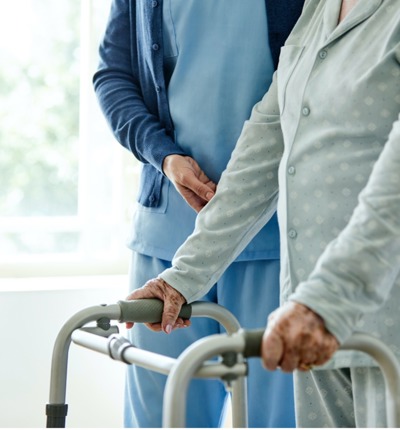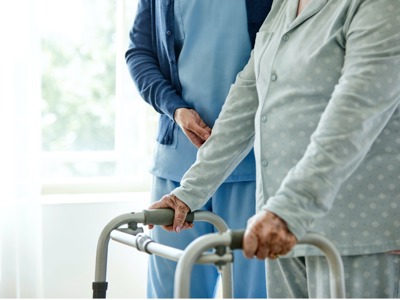
John’s Campaign continue fight on visits out and 14-day self-isolation requirement
John’s Campaign are threatening to bring legal proceedings if the requirement to self-isolate for 14 days after a visit out is not dropped.
Posted on 16 April 2021
After government guidance in force from 12 April made clear that the Department for Health and Social Care (DHSC) is maintaining the requirement to self-isolate for 14 days after a visit out, John’s Campaign is threatening to bring legal proceedings if the requirement is not dropped.
Following the announcement that John’s Campaign was launching a legal challenge before Easter, the DHSC dropped an age requirement from government guidance on visits out for people living in care homes. John’s Campaign welcomed the change but has made it clear that the campaign will continue to press for removal of the requirement to self-isolate for 14 days on return from a visit out. The DHSC’s updated guidance maintains the requirement to self-isolate for 14 days on return from visits out, which the DHSC itself has recognised “is likely to mean that many residents will not wish to make a visit out of the home.”
In response, John’s Campaign, represented by law firm Leigh Day, has sent a further pre-action protocol letter to the DHSC to say that the imposition of a 14-day self-isolation requirement upon return from any visit out creates an unacceptable risk of illegality, because it requires care homes to act unlawfully. John’s Campaign argues that by imposing the rule, the guidance requires/encourages care homes to falsely imprison care home residents and/or deprive residents of their liberty contrary to Article 5 ECHR.
With no legal basis for the requirement, the 14-day self-isolation rule is imposed on all residents, irrespective of their personal circumstances, the nature of their visit out, and the impact of self-isolation on them, with no account being taken of their particular needs and vulnerabilities. By requiring this undifferentiated approach, the Guidance requires care home providers to ignore their obligations under the Equality Act 2010 and/or Article 14 ECHR to take an individualised approach.
John’s Campaign co-founders Julia Jones and Nicci Gerrard have heard from many families whose loved ones are affected by the rule since first announcing they planned to take action against the guidance on visits out. Many stories have made it clear that visits out are rendered impossible by the self-isolation requirement. Many have also expressed concern about the fact that whilst the general population has been given a clear roadmap out of lockdown, the guidance for care home residents who have suffered disproportionately during the pandemic is not fit for purpose.
Those who have contacted John’s Campaign include: (names have been changed)
- Flora, whose sister Kate is disabled and lives in the grounds of a large residential care home. Both Flora, her partner and Kate have now had two vaccinations and weekly Covid tests. Before lockdown, Kate had been coming to stay with Flora every three weeks for most of her life but because of the 14-day isolation rule on return, this is no longer possible. Flora said:
“The 14-day isolation rule is barbaric and prohibitive. Kate having to isolate would be absolutely impossible, they would have to lock her in her room. It’s a catch 22 situation. What will need to change for care homes to allow people out? What is the road map? With the vaccinations this is as good as it is ever going to be for care home residents, you can never mitigate against all risks. Individualised risk management plans are so important in this situation, a blanket policy across everybody doesn’t make sense when everyone’s needs are individual. It is a deprivation of liberty. If lateral flow tests are an acceptable means for staff to go in and out, why is the same not applied to residents?”
- Lucy, whose mother used to like going to the garden centre with her before the pandemic. Lucy’s mother lives in a care home. Both her and her daughter have been vaccinated. Shielding for her conditions has now fully ended and others her age who have similar conditions but are not living in care homes are able to meet outside. Lucy says:
“We do not ask for the earth - just to get her into her wheelchair and walk down to the park, picking up a takeaway coffee on the way. There is a sign in some care homes that says ‘residents do not live in our workplace, we work in their home’ yet sadly care home residents seem to be being held captive. It’s like being under house arrest. Even prisoners have a projected release date when entering prison but these elders have no such hope and their clocks are ticking louder than anyone’s. They are alive but not living.
“Being kept indoors has been really detrimental to mum’s health. She’s depressed, I can see that in her actions, she doesn’t read like she used to, she doesn’t turn the TV on, she doesn’t want to pick up the phone, it’s all these things that are a real worrying. She has always been very stoic and kept a cheerful face but she’s mostly sad now”.
- Susan, whose father is 89 and living in a care home since breaking his hip. She has had both vaccinations and so has her father. She said:
“The whole thing is grossly unfair. We are not all in this together, because there is a huge difference between what some people are allowed to do. I don’t see why we are all having these vaccinations unless people can then go out.
“My dad says it is like a prison. He loves to drive and go to the seaside but he can’t get out. He knows I’m not allowed to take him and says he understands but it really upsets him – he is nearly in tears sometimes.”
Julia Jones, co-founder of John’s Campaign, said:
"At a time that we are mourning the death of an almost-centenarian who lived his life fully to the end, I find it deeply saddening that we have to take the government to court to establish the right for all adults to be able to step out into the fresh air accompanied by a trusted friend or family member. There are probably as many people living and working in a castle as in a medium-sized care home but I dread to think what Prince Philip would have said if he'd been told he needed to self-isolate for 14 days after a walk with his wife in the park!
“The current Government guidance that effectively imprisons all care home residents by the threat of 14 days 'self-isolation' reveals a shameful disregard for a group of people who have already lost more than a year from their lives. The impact on younger people with autism or learning disability who lose not only their access to their family home but also their chances to attend the outside activities promised by their care plans is incalculable. No Duke of Edinburgh award scheme participation for them. The government needs to respect the human rights of all the adults in our society, no matter what their home address."
John’s Campaign is represented by Tessa Gregory and Carolin Ott of law firm Leigh Day.
Tessa Gregory said:
“The current government guidance imposes a self-isolation requirement that our client believes has no legal basis and unlawfully encourages care homes to falsely imprison their residents; it is not fit for purpose and must be urgently reviewed.”
Find out more

Human rights
If you believe your human rights have been denied our human rights and civil liberties team is one of the leading teams of practitioners in this specialist area in the country.

John’s Campaign response to further updates to government visits-out guidance for care homes
Following announcement of the launch of a legal challenge by John’s Campaign which prompted a public outcry over the Easter weekend, an age requirement has been dropped from government guidance on visits out for people living in care homes.



